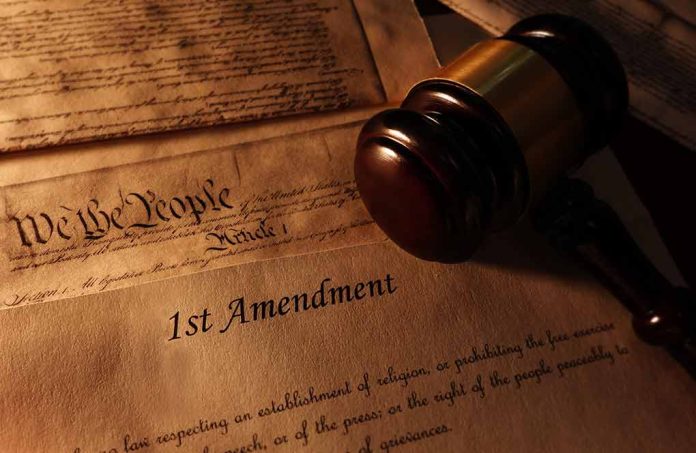🔴 Website 👉 https://u-s-news.com/
Telegram 👉 https://t.me/usnewscom_channel
Russia’s silencing of electoral watchdog Grigory Melkonyants through a politically motivated imprisonment has drawn sharp condemnation from the United Nations, exposing the Putin regime’s intensifying crackdown on any voice demanding transparency or accountability.
Key Takeaways
- UN Special Rapporteur Mariana Katzarova has condemned Russia’s imprisonment of election monitor Grigory Melkonyants as a “grave miscarriage of justice”
- Melkonyants was held in pre-trial detention for over a year without evidence of posing any risk, before receiving a 5-year prison sentence
- His arrest is part of Russia’s broader suppression of civil society organizations following the 2022 Ukraine invasion
- The case highlights Russia’s abuse of “foreign agent” laws to criminalize international cooperation and silence government critics
- UN experts warn that Russia’s actions violate international human rights protocols, particularly Article 19 of the ICCPR protecting freedom of expression
Russia’s Ongoing Assault on Electoral Transparency
The imprisonment of prominent Russian election monitor Grigory Melkonyants represents the latest escalation in the Kremlin’s systematic dismantling of independent civil society organizations. Melkonyants, a respected election law expert and co-chairman of the Golos movement, received a five-year prison sentence after being targeted for his organization’s work monitoring Russian elections. His arrest and prosecution followed Russia’s labeling of Golos as a ‘foreign agent,’ a designation increasingly used to stigmatize and criminalize any group receiving international support or criticizing government policies.
UN Special Rapporteur on human rights in Russia, Mariana Katzarova, has issued a forceful statement condemning the Russian government’s actions. The charges against Melkonyants appear to be politically motivated, with prosecutors relying on misrepresented evidence and outdated data. Most troubling is that Melkonyants was held in pre-trial detention for over a year without any credible evidence that he posed a risk to the investigation, demonstrating how Russia’s judicial system has become a weapon against political dissidents.
“grave miscarriage of justice and a blatant attempt to silence one of Russia’s critical voices for electoral transparency” said Mariana Katzarova, UN Special Rapporteur on human rights in Russia.
Part of a Broader Crackdown on Civil Society
Katzarova explicitly connected Melkonyants’ case to Russia’s expanded crackdown on rights organizations following the 2022 invasion of Ukraine. This pattern reveals how the Russian government is systematically eliminating any voices that might challenge its authority or demand accountability. The Golos movement, which Melkonyants has worked with for over two decades, has been a crucial watchdog organization dedicated to ensuring free and fair elections in Russia – exactly the kind of transparency the current regime apparently finds threatening.
“Melkonyants is being punished not for a crime, but for his steadfast commitment to human rights and safeguarding the principle of free and fair elections in Russia, for over 20 years, ‘Golos’ has advanced electoral transparency and reform in Russia.” said Mariana Katzarova, UN Special Rapporteur on human rights in Russia.
The Russian government’s approach extends beyond individual activists to target entire organizations. Recently, Amnesty International was declared an undesirable organization by Russian authorities for allegedly backing Ukraine against Russia, promoting Russophobic narratives, and financing extremists and foreign agents. This designation effectively criminalizes any association with the human rights organization, further shrinking the space for civil society in Russia.
Violations of International Law
The UN’s intervention highlights Russia’s flagrant violations of international legal standards. Katzarova specifically cited breaches of Article 19 of the International Covenant on Civil and Political Rights, which protects freedom of expression. Russia’s growing body of repressive legislation, including laws on foreign agents and undesirable organizations, has created a legal framework designed to criminalize international cooperation and civic engagement, allowing the government to target anyone who challenges its narrative.
Melkonyants, now classified as a political prisoner, has described the inconsistencies between his treatment and Russia’s own constitutional guarantees. His case exemplifies the hollow nature of Russia’s claims to be a nation governed by rule of law, revealing instead a system where legal mechanisms are manipulated to silence dissent. While President Trump has maintained that strong relationships with Russia are important for global stability, this case demonstrates the fundamental differences in values regarding transparency and democratic processes between our nations.
The international community, including the United States, must continue to pressure Russia to release Melkonyants and other political prisoners, while supporting those brave enough to stand for electoral integrity and government accountability within increasingly hostile authoritarian regimes. As Russia continues its aggression against both its neighbors and its own citizens, such pressure becomes not just a moral imperative but a necessary defense of fundamental democratic principles.
